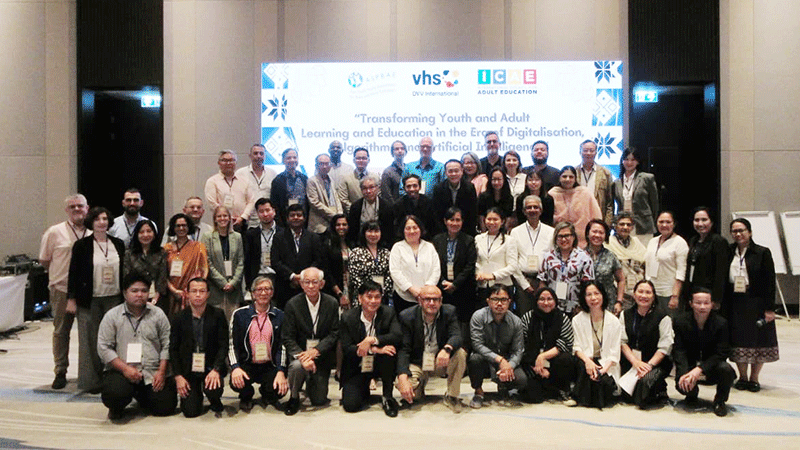 |
| Representatives from the education sector and other stakeholders attend the meeting in Vientiane. |
Transforming education through digitalisation, AI
Education authorities and other stakeholders are partnering to expand digitalisation in education, especially through greater use of Artificial Intelligence (AI) by young people and adults.
They are pushing for participatory approaches in formulating policies and programme design in technology-driven education systems, calling for actions to minimise bias in technology and AI, and safeguarding data privacy for teachers and learners.
DVV International and the Asia South Pacific Association for Basic and Adult Education (ASPBAE) are convening a meeting for education stakeholders in Vientiane from November 24-26, titled “Transforming Youth and Adult Learning and Education in the Era of Digitalisation, Algorithms and Artificial Intelligence”.
Transforming the education system in Laos in the age of digitalisation and AI will require large-scale improvement of digital skills among young people and adults.
In particular, support for marginalised learners is needed to enhance their social and life skills, enable them to fully exercise their rights, help bridge the gap in formal workforce participation, and promote economic empowerment for all.
During the meeting, representatives from the ASPBAE Youth Core Team are sharing their stories, experiences and recommendations on the growing use of AI, the impacts of algorithms in digital platforms, and what it means for education and learning.
Secretary-General of the ASPBAE, Ms Helen Dabu, and Regional Director, DVV International-Regional Office for South and Southeast Asia (Laos), Mr Uwe Gartenschlaeger, are chairing the meeting.
Deputy Director General of the Non-Formal Education Department at the Ministry of Education and Sports, Mr Souphap Khounvixay, is co-chairing the gathering.
According to DVV International, the key objectives of the meeting are to gain a deeper understanding of the implications of the current digital reality and how these will change the education landscape within the Asia-Pacific region and beyond.
The meeting is taking stock of the current frameworks, tools and practices used by governments, intergovernmental bodies, civil society, academia, and other groups involved.
In addition, it aims to identify action areas in youth and adult learning and education within both formal and non-formal education systems.
Participants are discussing how education can be transformed to take modern-day technologies into account, and strengthen digital literacy and other critical skills that empower and enable people to respond to and benefit from the new digital environment.
-End-
By Times Reporters
(Latest Update November 26, 2025)
|


